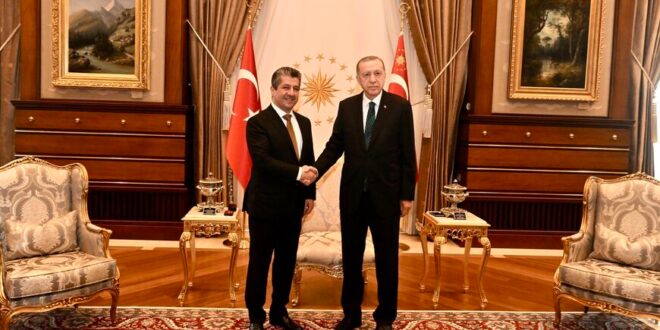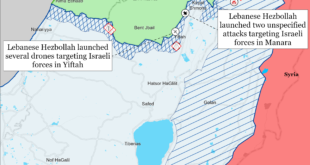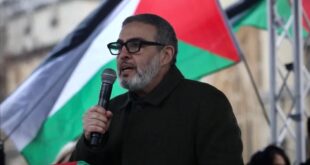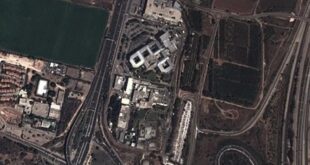Prime Minister Masrour Barzani of the Kurdistan Region of Iraq met with Turkish President Recep Tayyip Erdogan in Ankara as the deadlock continues over the exportation of Iraqi and KRG crude.
Masrour Barzani, the prime minister of the Kurdistan Region of Iraq, became the first foreign leader to pay a formal visit to Turkish President Recep Tayyip Erdogan following his reelection in May. Barzani met with Erdogan in his palace in Ankara.
Barzani tweeted that he had congratulated the Turkish leader on his reelection and that the pair had “discussed advancing bilateral relations between the Kurdistan Region and [Turkey] and the latest developments in Iraq and the region.” The Kurdistan Regional Government (KRG) is expected to issue a readout of the meeting.
The visit comes amid a continued deadlock over the exportation of Iraqi and KRG crude via a pipeline running to export terminals on Turkey’s Mediterranean shores. A Monday meeting between a Turkish energy delegation and Iraqi officials in Baghdad was inconclusive and further talks are needed, unnamed officials told Reuters without elaborating.
Turkey halted Iraq’s 450,000 barrels per day of exports running through the northern pipeline on March 25 after the International Chamber of Commerce ordered Ankara to pay damages of $1.5 billion for allowing the KRG to sell its oil independently of Baghdad between 2014 and 2018. The Iraqi government launched the arbitration case on the grounds that the sales were illegal.
Pleased to meet with President @RTErdogan in Ankara today and congratulate him on his re-election.
We discussed advancing bilateral relations between the Kurdistan Region and Türkiye and the latest developments in Iraq and the region. pic.twitter.com/vFtaYF9QSK
— Masrour Barzani (@masrourbarzani) June 20, 2023Income from oil is used to cover state employment wages in the Kurdistan Region and Reuters reported that KRG losses due to the hiatus had cost more than $2.2 billion in lost revenue.
The flow was expected to resume in the wake of Turkey’s twin parliamentary and presidential polls and under an export deal reached between Iraq’s State Organization for Marketing of Oil and the KRG. However, it is becoming increasingly clear that Turkey is holding out in order to wrest concessions from Baghdad.
Regional diplomatic sources familiar with the negotiations said Ankara is concerned by the outcome of another arbitration case launched by Iraq that covers sales between 2018 and the start of this year. Turkey wants Iraq to drop the case as a precondition for resuming exports. The diplomatic sources, who spoke to Al-Monitor on condition of anonymity, said that unnamed Iran-backed militias in Baghdad were unwilling to cooperate. The United States has been lobbying Baghdad and Ankara behind the scenes but to little effect.
In any case, a breakthrough was unlikely in today’s meeting, as the KRG does not call the shots. However, it did set the stage for a new era of cooperation between Erdogan and Barzani. The KRG leader has strong ties to Turkey’s new foreign minister, Hakan Fidan, cultivated during long years collaborating as their countries’ respective intelligence chiefs. Fidan, who has ethnic Kurdish roots, was in the room with Erdogan and Barzani and the pair met separately as well.
Erdogan’s favorite Iraqi Kurdish official is the KRG premier’s paternal cousin, Nechirvan Barzani, who is the president of the Kurdistan Region of Iraq. As KRG prime minister in 2013, he helped cement a mega energy deal with Turkey that paved the way for oil exports through the purpose-built pipeline that now lies idle. The two have strong chemistry and the Iraqi Kurdish president was invited to attend Erdogan’s June 3 inauguration bash in Ankara, in keeping with protocol as much as friendship.
But there is growing acceptance in Erdogan’s inner circle that the KRG prime minister holds the most power. The sources briefing Al-Monitor said Fidan had played a key role in brokering today’s meeting.
The Barzani-led Kurdistan Democratic Party of Iraq (KDP) remains the most influential force in the KRG. The KDP is a key ally in Ankara’s ongoing military campaign against the outlawed Kurdistan Workers Party (PKK), whose top leaders are based in the rugged mountains separating Turkey from Iraq. Turkey has thousands of troops deployed across the Iraqi Kurdish region and has been systematically picking off PKK cadres in drone strikes in Iraq and Syria alike.
As Barzani was meeting with Erdogan, pro-PKK news outlets reported that a Turkish drone had killed two top officials in the Kurdish-led Autonomous Administration in northeast Syria today. Yusra Darwish, the female co-chair of the administrative council of Qamishli perished after her car was struck outside the town, which borders Turkey.
Friendship with the KRG allows Ankara to prove that it’s not hostile to Kurds but only to the PKK and its alleged allies. Erdogan played this card during his election campaign with plenty of help from the KDP.
The benefits cut both ways. In addition to being the Kurdistan Region’s sole outlet to the West, Turkey is also a vital counterbalancing force against the Iraqi Kurds’ ever meddlesome and sometimes lethal neighbor, Iran.
Yet for all the common interests binding Ankara and Erbil, it did not go unnoticed that the KRG’s tricolor was not on display in the official photo showing Erdogan and Barzani shaking hands. There were only two Turkish flags and the Turkish presidential seal. Since 2015, when Erdogan pirouetted away from peace talks with the PKK and struck his current alliance with far-right nationalists, the Iraqi Kurdish flag has disappeared, likely gathering dust in the palace cupboard.
 Eurasia Press & News
Eurasia Press & News




